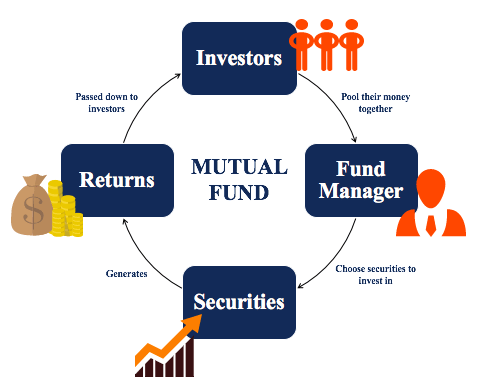Mutual funds are funds that pool the money of several investors to invest in equity or debt markets.
What are mutual funds?
A mutual fund is a company that pools money from many investors and invests the money in securities such as stocks, bonds, and short-term debt. The combined holdings of the mutual fund are known as its portfolio. Investors buy shares in mutual funds.
Each share represents an investor’s part ownership in the fund and the income it generates.
Funds are selected on quantitative parameters like volatility, FAMA Model, risk adjusted returns, and rolling return coupled with a qualitative analysis of fund performance and investment styles through regular interactions / due diligence processes with fund managers.
Advantages of Mutual Fund
- Flexibility : Systematic investment plans, systematic withdrawal plans & dividend reinvestment.
- Affordability : Available in units so even a small investor can benefit from its investment strategy.
- Potential of return : The fund managers who identify opportunities for your investments to flourish.
- Low Costs : The benefits of scale in brokerage, custodial and other fees translate into lower costs for investors.
- Regulatory : The sector is regulated to safeguard the investor’s interests.
Types of Mutual Funds
Most mutual funds fall into one of four main categories. Each type has different features, risks, and rewards.
- Money market funds have relatively low risks. By law, they can invest only in certain high-quality, short-term investments issued by U.S. corporations, and federal, state and local governments.
- Bond funds have higher risks than money market funds because they typically aim to produce higher returns. Because there are many different types of bonds, the risks and rewards of bond funds can vary dramatically.
- Stock funds invest in corporate stocks. Not all stock funds are the same. Some examples are:
- Growth funds focus on stocks that may not pay a regular dividend but have potential for above-average financial gains.
- Income funds invest in stocks that pay regular dividends.
- Index funds track a particular market index such as the Standard & Poor’s 500 Index.
- Sector funds specialize in a particular industry segment.
- Target date funds hold a mix of stocks, bonds, and other investments. Over time, the mix gradually shifts according to the fund’s strategy. Target date funds, sometimes known as life cycle funds, are designed for individuals with particular retirement dates in mind.



